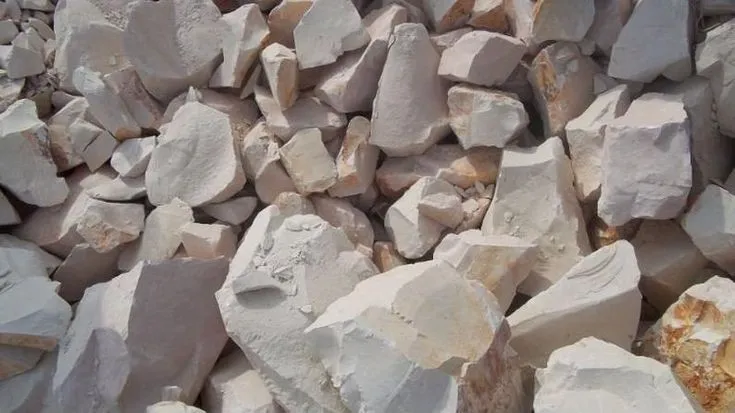Everything You Need to Know About Nzu (Calabash Chalk)
Nzu, also known as calabash chalk, is a type of traditional African medicine that is made from the ground shells of calabashes (large gourds) mixed with water. It is used as a natural remedy for a variety of ailments, including skin conditions, digestive issues, and respiratory problems.
It is commonly used in many African countries, particularly in West Africa. It is believed to have medicinal properties due to the presence of calcium carbonate, which is known to have antacid and astringent properties.
It is believed to have a variety of medicinal properties and is used to treat a range of ailments, including skin conditions, digestive issues, and respiratory problems.
To use, a small amount of the chalk is mixed with water to form a paste, which is then applied to the affected area or ingested. It is sometimes used in conjunction with other traditional remedies or herbal medicines.
Additionally, there is a lack of information on long-term safety, as it has not been studied extensively. It is not known if it is safe to use Nzu daily or for extended periods.
It is important to note that the safety and effectiveness of Nzu as a medicinal treatment have not been thoroughly tested or proven in scientific studies. As with any alternative or traditional medicine, it is important to speak with a healthcare professional before using it to ensure it is appropriate and safe for you.
In this article, we will be discussing everything about Nzu; both its Health Benefits and its harmful effects of it. its use as a medicinal treatment is based on traditional beliefs and practices, and there is limited scientific evidence to support its effectiveness. The safety and potential side effects have not been thoroughly tested or proven.
Health Benefits of Nzu

Nzu, also known as white clay, is a type of clay that is commonly used in traditional medicine practices in West Africa.
Skin Health
Nzu is often used to treat a variety of skin conditions, including acne, eczema, and other inflammatory conditions.
It is believed to have several health benefits when applied topically to the skin or taken internally.
It is believed to have astringent and purifying properties that help to cleanse and tighten the pores, helping to reduce the appearance of acne and other blemishes.
Digestive Health
Nzu is believed to have laxative properties that can help to promote regular bowel movements and relieve constipation. It may also help to reduce bloating and improve overall digestive health.
Detoxification Purpose
Nzu is thought to have detoxifying properties that may help to remove toxins from the body. This can potentially help to improve liver function and boost the immune system.
Oral Health
Nzu is sometimes used as a natural tooth whitener and is believed to have antimicrobial properties that may help to prevent tooth decay and gum disease.
In addition to the potential health benefits listed above, it is also believed to have several other potential benefits when used topically or taken internally.
Some people use it as a natural deodorant, as it is believed to have antimicrobial properties that can help to reduce body odor. It is also sometimes used to treat insect bites, cuts, and other minor skin injuries, as it is believed to have soothing and healing properties.

Nzu is also sometimes taken internally to help with weight loss, as it is believed to have appetite-suppressing properties. It is also thought to have anti-inflammatory properties that may help to reduce inflammation in the body, which may be beneficial for people with conditions such as arthritis or asthma.
It’s important to note that the potential health benefits of Nzu are largely based on traditional use and have not been extensively studied in scientific research.
More research is needed to confirm the safety and effectiveness of Nzu for the treatment of various health conditions. It is always important to consult with a healthcare provider before using any new supplement or treatment.
Nzu (Calabash Chalk) Harmful Effects
There are a few potential risks associated with the use of Nzu. It may contain impurities or contaminants that could be harmful if ingested or applied to the skin.
In addition, it is possible that it could interact with certain medications or have other unintended side effects. It is always best to consult with a healthcare professional before using any new treatment or remedy.
If you are considering using Nzu or any other alternative or traditional medicine, it is important to do your research and be aware of the potential risks and limitations.
It is always best to work with a healthcare professional to ensure that any treatment or remedy you use is safe and appropriate for you.
Nzu, also known as calabash chalk or African whitewash, is a traditional building material used in West and Central Africa. It is made from water, slaked lime (a type of calcium hydroxide), and clay, and is used as a plaster for walls and a whitewash for surfaces.
There is limited information available on the potentially harmful effects of using Nzu. Some potential concerns include:
respiratory irritation
The dust produced during the mixing and application may cause respiratory irritation, especially if inhaled in large amounts.
skin Irritation
The lime in Nzu may cause skin irritation, especially if it comes into contact with cuts or abrasions.
environmental Impact
The production and use of Nzu may have an environmental impact, as it involves the extraction of raw materials and the use of energy.
Structural Integrity
Nzu may not provide the same level of structural integrity as other building materials, such as cement or brick. This could be a concern in areas prone to earthquakes or other natural disasters.
It is important to note that these potentially harmful effects may vary depending on the specific ingredients and method of production.
If you are considering using it in your home or building, it may be advisable to consult with a qualified professional or conduct further research to understand the potential risks and benefits.
Health Risks
Some studies have suggested that its use may be associated with an increased risk of respiratory diseases, such as asthma and chronic obstructive pulmonary disease (COPD). This may be due to the inhalation of dust and other particles during the mixing and application of Nzu.
chemical Hazards
The lime in Nzu is highly alkaline and can cause chemical burns if it comes into contact with the skin or eyes. It is important to take precautions when handling, including wearing protective clothing and eyewear.
Lead Contamination
Some Nzu products may contain lead, which is a toxic heavy metal that can have harmful effects on the brain, nervous system, and other organs.
Lead can be harmful, especially to children and pregnant women, and can cause developmental delays, learning difficulties, and other health problems.
It is important to be aware of the potential for lead contamination when using and to use caution when handling or using it.
Safety Concerns
Nzu may not provide the same level of fire resistance as other building materials, such as cement or brick. This could be a concern in areas prone to fires or other natural disasters.
It is important to consider the safety implications of using Nzu and to take appropriate precautions to protect against potential hazards.
Read Also: 10 Health Benefits of Osu Fruit (Hunteria umbellata)
Conclusion
While there are many potential health benefits of Nzu, it is important to note that most of these benefits are based on traditional use and have not been extensively studied in scientific research.
As such, it is important to be cautious when using Nzu and to consult with a healthcare provider before using it as a treatment or supplement. There are also some potential risks and side effects associated with using Nzu.
For example, it may cause skin irritation or allergic reactions in some people, especially if it is used undiluted or if it is applied to broken or damaged skin.






